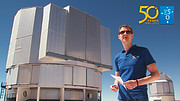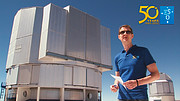Annuncio
ESOcast 46: Catching Light
Special 50th anniversary episode #6
01 Agosto 2012
Leading up to ESO’s 50th anniversary in October 2012, we are releasing eight special ESOcasts, each a chapter from the movie Europe to the Stars — ESO’s First 50 Years of Exploring the Southern Sky.
ESOcast 46 is the sixth special episode of this series. It describes how state-of-the-art cameras and spectrographs help ESO’s powerful telescopes collect and analyse the faint light from the distant Universe. Without these instruments, ESO’s eyes on the sky would be blind.
Today’s astronomical images are very different from those from the 1960s. Back then, astronomers used large photographic glass plates, which were not very sensitive and hard to handle. Nowadays, ESO’s telescopes use some of the largest and most sensitive electronic detectors in the world. They catch almost every cosmic photon and recover almost every possible bit of information. For instance, the VLT Survey Telescope’s camera — OmegaCAM — has 32 detectors, which team up to produce spectacular images of the Universe, each with an impressive 268 million pixels.
But astronomy is not only about taking breathtaking images. Astronomers are always after as much information as possible so they need to dissect the starlight into its component colours to study its composition. Spectroscopy is one of the most powerful tools in astronomy and ESO’s telescopes also have some of the world’s most powerful spectrographs, such as the powerful X-shooter at the Very Large Telescope. Spectroscopy allows astronomers to infer important properties of the stars, such as the chemical elements they contain, their temperatures, motions, and even their ages. Moreover, they can study the atmospheres of exoplanets orbiting distant stars or newborn galaxies at the edge of observable Universe.
Watch this episode to discover more about ESO’s state-of-the-art astronomical instruments.
More Information
The ESOcast is a video podcast series dedicated to bringing you the latest news and research from ESO — the European Southern Observatory.
Subscribe to our video podcast now to keep up with the latest news from ESO: the ESOcast is available via iTunes in HD and SD. It’s also available on YouTube, Vimeo and is offered for download in several formats including HD.
Links
- Watch and download the ESOcast 46 at this link
- All our video podcasts are available here
- Subscribe to the series now on iTunes in HD or SD
- Watch us on YouTube, Vimeo
- Like us on Facebook or follow us on Twitter for more news
Credits
Directed by: Lars Lindberg Christensen
Art Direction, Production Design: Martin Kornmesser
Producer: Herbert Zodet
Written by: Govert Schilling
3D animations and graphics: Martin Kornmesser & Luis Calçada
Editing: Martin Kornmesser
Cinematography: Herbert Zodet & Peter Rixner
Sound engineer: Cristian Larrea
Audio Mastering: Peter Rixner
Host & Lead Scientist: Dr J (Dr Joe Liske, ESO)
Narration: Sara Mendes da Costa
Soundtrack & Sound Effects: movetwo — Axel Kornmesser & Markus Löffler & zero-project (zero-project.gr)
Proof reading: Anne Rhodes
Technical support: Lars Holm Nielsen, Raquel Yumi Shida & Mathias Andre
DVD Authoring: Andre Roquette
Executive producer: Lars Lindberg Christensen
Footage and photos:
ESO, Christoph Malin (christophmalin.com), Babak Tafreshi/TWAN, Stéphane Guisard (eso.org/~sguisard), José Francisco Salgado (josefrancisco.org), Alexandre Santerne, Nick Risinger (skysurvey.org), Martin Kornmesser, Herbert Zodet, J. Dommaget/J. Boulon/J. Doornenbal/W., Schlosser/F.K. Edmondson/A. Blaauw/Rademakers/R. Holder, Mineworks, Daniel Crouch/Rare Books (crouchrarebooks.com), Getty Images, Royal Astronomical Society/Science Photo Library, Jay M. Pasachoff, Chris de Coning/South African Library/Warner-Madear, Africana Museum/Warner, Leiden University, G. Brammer, Mauricio Anton/Science Library, NASA/Spitzer Science Center/R. Hurt, VISTA/J. Emerson, Digitized Sky Survey 2, MPE/S. Gillessen/M. Schartmann, PIONIER/IPAG, Rainer Lenzen/MPIA Heidelberg, West-Eastern Divan Orchestra in Berlin by KolBerlin, Davide De Martin, Cambridge Astronomical Survey Unit, IDA/Danish 1.5 m/R. Gendler and C. Thöne, Mario Nonino, Piero Rosati and the ESO GOODS Team, ALMA (ESO/NAOJ/NRAO), The NASA/ESA Hubble Space Telescope, Matthias Maercker, Igor Chekalin, Hans-Hermann Heyer, Edmund Janssen, Luis Calçada, Scott Kardel, Tom Jarrett, Kevin Govender, Sergey Stepanenko, ESA, NASA, IAU/IYA2009, T. Preibisch, R. Fosbury (ST-ECF), INAF-VST/OmegaCAM, OmegaCen/Astro-WISE/Kapteyn Institute, A. Fujii, J.-B. Le Bouquin et al., D. Coe (STScI)/J. Merten (Heidelberg/Bologna), Gemini Observatory/NRC/AURA/Christian Marois et, al., M. Janson, Jean-Luc Beuzit, IAC (SMM) and ESPRESSO consortium, T.M. Brown (STScI), UltraVISTA team, TERAPIX/CNRS/INSU/CASU, World Wide Telescope
A proposito dell'annuncio
| Identificazione: | ann12053 |
Our use of Cookies
We use cookies that are essential for accessing our websites and using our services. We also use cookies to analyse, measure and improve our websites’ performance, to enable content sharing via social media and to display media content hosted on third-party platforms.
ESO Cookies Policy
The European Organisation for Astronomical Research in the Southern Hemisphere (ESO) is the pre-eminent intergovernmental science and technology organisation in astronomy. It carries out an ambitious programme focused on the design, construction and operation of powerful ground-based observing facilities for astronomy.
This Cookies Policy is intended to provide clarity by outlining the cookies used on the ESO public websites, their functions, the options you have for controlling them, and the ways you can contact us for additional details.
What are cookies?
Cookies are small pieces of data stored on your device by websites you visit. They serve various purposes, such as remembering login credentials and preferences and enhance your browsing experience.
Categories of cookies we use
Essential cookies (always active): These cookies are strictly necessary for the proper functioning of our website. Without these cookies, the website cannot operate correctly, and certain services, such as logging in or accessing secure areas, may not be available; because they are essential for the website’s operation, they cannot be disabled.
Functional Cookies: These cookies enhance your browsing experience by enabling additional features and personalization, such as remembering your preferences and settings. While not strictly necessary for the website to function, they improve usability and convenience; these cookies are only placed if you provide your consent.
Analytics cookies: These cookies collect information about how visitors interact with our website, such as which pages are visited most often and how users navigate the site. This data helps us improve website performance, optimize content, and enhance the user experience; these cookies are only placed if you provide your consent. We use the following analytics cookies.
Matomo Cookies:
This website uses Matomo (formerly Piwik), an open source software which enables the statistical analysis of website visits. Matomo uses cookies (text files) which are saved on your computer and which allow us to analyze how you use our website. The website user information generated by the cookies will only be saved on the servers of our IT Department. We use this information to analyze www.eso.org visits and to prepare reports on website activities. These data will not be disclosed to third parties.
On behalf of ESO, Matomo will use this information for the purpose of evaluating your use of the website, compiling reports on website activity and providing other services relating to website activity and internet usage.
Matomo cookies settings:
Additional Third-party cookies on ESO websites: some of our pages display content from external providers, e.g. YouTube.
Such third-party services are outside of ESO control and may, at any time, change their terms of service, use of cookies, etc.
YouTube: Some videos on the ESO website are embedded from ESO’s official YouTube channel. We have enabled YouTube’s privacy-enhanced mode, meaning that no cookies are set unless the user actively clicks on the video to play it. Additionally, in this mode, YouTube does not store any personally identifiable cookie data for embedded video playbacks. For more details, please refer to YouTube’s embedding videos information page.
Cookies can also be classified based on the following elements.
Regarding the domain, there are:
- First-party cookies, set by the website you are currently visiting. They are stored by the same domain that you are browsing and are used to enhance your experience on that site;
- Third-party cookies, set by a domain other than the one you are currently visiting.
As for their duration, cookies can be:
- Browser-session cookies, which are deleted when the user closes the browser;
- Stored cookies, which stay on the user's device for a predetermined period of time.
How to manage cookies
Cookie settings: You can modify your cookie choices for the ESO webpages at any time by clicking on the link Cookie settings at the bottom of any page.
In your browser: If you wish to delete cookies or instruct your browser to delete or block cookies by default, please visit the help pages of your browser:
Please be aware that if you delete or decline cookies, certain functionalities of our website may be not be available and your browsing experience may be affected.
You can set most browsers to prevent any cookies being placed on your device, but you may then have to manually adjust some preferences every time you visit a site/page. And some services and functionalities may not work properly at all (e.g. profile logging-in, shop check out).
Updates to the ESO Cookies Policy
The ESO Cookies Policy may be subject to future updates, which will be made available on this page.
Additional information
For any queries related to cookies, please contact: pdprATesoDOTorg.
As ESO public webpages are managed by our Department of Communication, your questions will be dealt with the support of the said Department.

